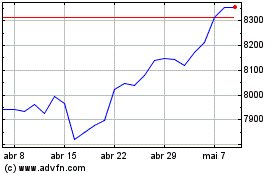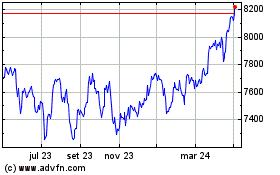Stocks, Oil Fall as Rescue Package Stalls in Senate
23 Março 2020 - 9:26AM
Dow Jones News
By Joanne Chiu and Anna Isaac
The rapid spread of coronavirus cases and Washington's delay
over an economic rescue package rattled markets early Monday,
sending U.S. stock futures, global stocks and oil prices lower.
S&P 500 futures fell 2.6%, after briefly hitting the maximum
5% loss allowed in a single session. That suggested U.S. shares
would face further pressure Monday. Last week, the Dow Jones
Industrial Average and S&P 500 indexes registered their worst
weeks since October 2008.
"The futures market is really getting hit on the fact that the
stimulus and fiscal relief package was falling foul of the
political impasse in the Senate," said Andy Maynard, managing
director of equities sales and trading at China Renaissance
Securities.
U.S. lawmakers and administration officials had hoped to reach
an agreement on a $1.3 trillion deal so both chambers of Congress
could approve it Monday. But the package hit a procedural roadblock
in the Senate Sunday, a sign of political discord amid a national
emergency.
Mr. Maynard said this added to concerns stoked by rising
infection figures, statewide restrictions on activity, and
expectations for rising U.S. unemployment.
European markets traded lower. The Stoxx Europe 600
pan-continental index fell 3.8%, and the German Dax dropped 3.7%.
German Chancellor Angela Merkel is self-isolating after coming into
contact with an infected doctor. The government is set to adopt
fiscal measures worth EUR500 billion ($535 billion) to help cushion
Europe's economic powerhouse from the impact of the pandemic. The
U.K.'s benchmark FTSE 100 fell 3.7% to nearly its lowest point in a
decade.
While stocks were getting hammered, investors sought shelter in
traditional safe-haven assets, such as bonds, gold and currencies
like the Swiss franc and Japanese yen, a return to a more
traditional trading pattern that gave some investors solace. For
several days last week, those assets fell along with stocks, a sign
that markets were coming under severe strain.
"We're not at a turning point yet, we're still seeing a crisis
in markets. But, there are signs that some of the stress may be
easing," said Lee Hardman, currency analyst at MUFG Bank. He
pointed to efforts central banks, including the Federal Reserve,
made last week to calm markets.
The yield on the 10-year U.S. Treasury note fell 0.125
percentage point to 0.813%, according to Tradeweb, as investors
sought the safety of government bonds. Yields move in the opposite
direction to prices.
The world's biggest companies took action to withstand prolonged
disruption from the coronavirus crisis. Royal Dutch Shell PLC said
Monday that it was cutting costs to reinforce its financial
position amid the continuing impact on its operations, and on oil
prices.
Power generator Aggreko PLC and aircraft maker Airbus SE
withdrew their investor guidance to calibrate the impact of
coronavirus on demand. Airbus withdrew its dividend proposal and
boosted its credit facility by EUR10 billion ($10.7 billion).
In the U.K., the Financial Conduct Authority pushed companies
over the weekend not to make hasty updates to investors, noting the
fast-moving impact of the coronavirus on the economy and on the
capabilities of companies and auditors.
"The practice of issuing preliminary financial statements in
advance of the full audited financial statements is adding
unnecessarily to the pressure on companies and the audit profession
at this moment," the chief market regulating body said.
Brent crude oil fell 4.5% to $25.77 a barrel. That put the
global oil benchmark close to the $24.88 level it hit Wednesday,
which was the lowest since May 2003. Crude prices have plunged on
worries about reduced demand and a price war among major oil
producers.
In Asia-Pacific, most stock benchmarks dropped. Australia's
benchmark S&P/ASX 200 fell nearly 6% to levels last reached in
2012, despite the country's federal government rolling out a
stimulus package of 66 billion Australian dollars ($38 billion).
Indian shares plunged, triggering trading halts, with the S&P
BSE Sensex index falling nearly 13%.
Japan's Nikkei 225 bucked the downtrend, ending 2% higher. It
had been closed Friday, when some other Asian markets had rallied.
Shares in SoftBank Group, a major index constituent, soared on
plans to sell up to Yen4.5 trillion ($41 billion) of assets to buy
back shares and redeem debt.
Write to Joanne Chiu at joanne.chiu@wsj.com and Anna Isaac at
anna.isaac@wsj.com
(END) Dow Jones Newswires
March 23, 2020 08:11 ET (12:11 GMT)
Copyright (c) 2020 Dow Jones & Company, Inc.
FTSE 100 (FTSE:UKX)
Gráfico Histórico do Índice
De Mar 2024 até Abr 2024

FTSE 100 (FTSE:UKX)
Gráfico Histórico do Índice
De Abr 2023 até Abr 2024
